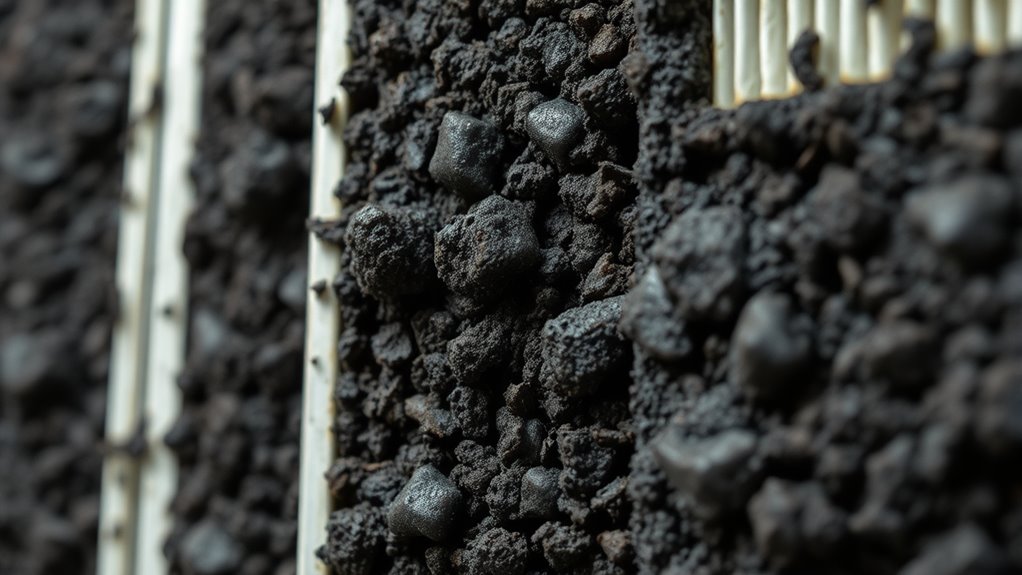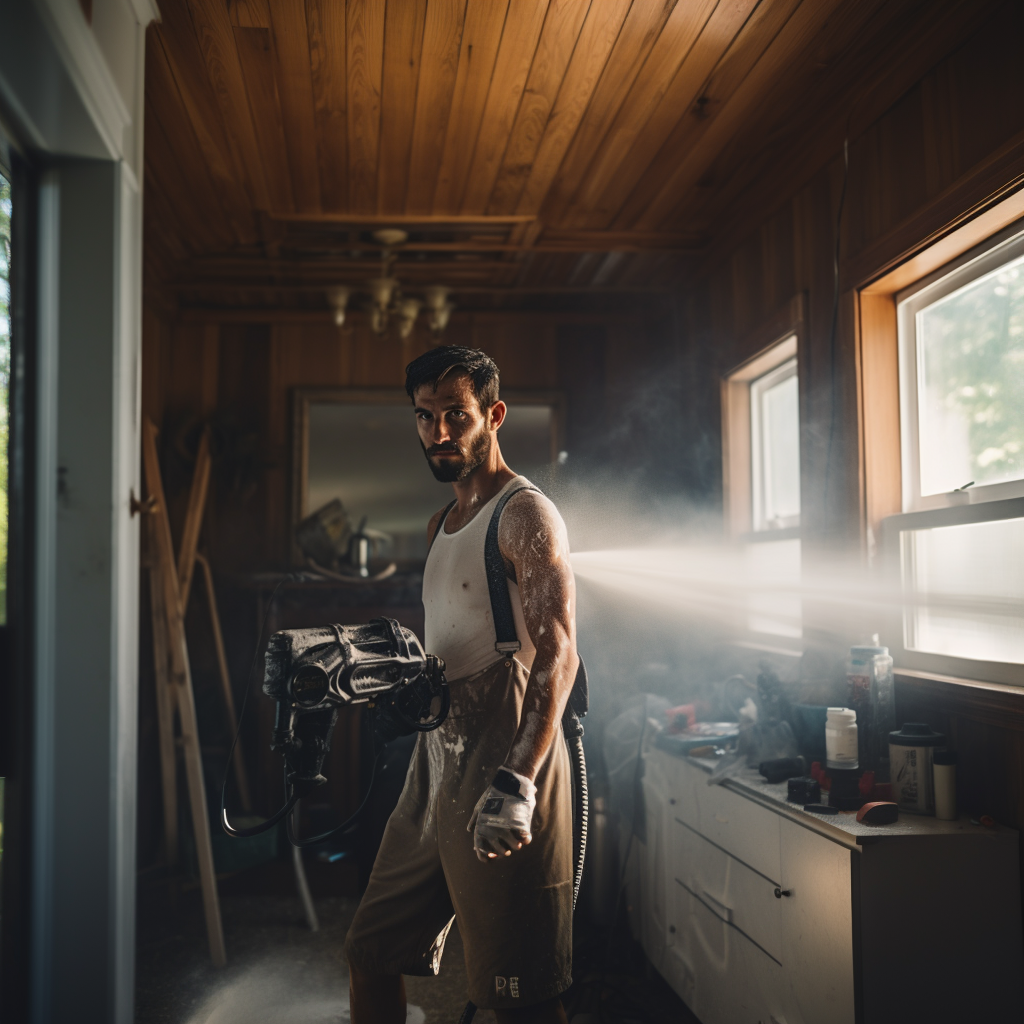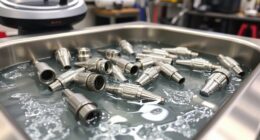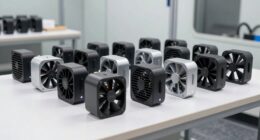If your filters keep plugging, the main causes are poor water quality, high sediment levels, or using low-quality filters not suited for your water conditions. Regular debris, algae, or impurities overload the filter media, causing frequent clogs. To fix this, consider installing pre-filters, upgrading to more advanced systems, or improving water treatment before filtration. Keep in mind, addressing these issues can extend filter life and improve water quality—if you want to learn more, there’s helpful information ahead.
Key Takeaways
- Poor water quality with high sediment or impurities causes rapid filter clogging.
- Inadequate or low-quality filters are more prone to frequent plugging and need regular replacement.
- Lack of maintenance or ignoring scheduled filter changes leads to debris buildup and faster clogging.
- Installing pre-filters or higher-capacity systems can reduce debris load and extend filter life.
- Addressing underlying water quality issues ensures filters last longer and operate effectively.

Have you noticed your filters clogging up more quickly than usual? This common issue often points to underlying problems with water quality or an unexpectedly short filter lifespan. When filters become overwhelmed too fast, it’s a sign that something isn’t quite right with your water supply or the filter itself. Understanding these causes can help you troubleshoot effectively and prevent costly replacements or system failures down the line.
One of the main reasons filters clog so rapidly is poor water quality. If your water contains high levels of sediment, dirt, algae, or other particulates, your filter will have to work much harder to trap these impurities. As a result, the filter media quickly gets saturated or blocked, reducing its effectiveness and lifespan. If you live in an area with hard or contaminated water, you might notice your filters need replacing more frequently than recommended. This isn’t just a nuisance; it can also lead to decreased water flow and compromised filtration, affecting both taste and safety.
Another factor impacting filter lifespan is the type and condition of the filter you’re using. Cheaper or low-quality filters tend to have shorter lifespans because they may not be designed to handle high levels of contaminants or large volumes of water. Additionally, if you don’t replace filters on schedule, they accumulate debris, which makes them clog faster over time. A clogged filter not only hampers water flow but can also cause strain on your entire system, leading to potential damage or inefficiency.
Regular maintenance and monitoring are key to avoiding these issues. By checking your water quality periodically, you can determine if you need a more robust filtration system or additional pre-treatment steps. Installing a sediment pre-filter can help reduce the burden on your primary filter, extending its lifespan and maintaining better water quality. Also, always adhere to the manufacturer’s recommended replacement schedule; neglecting this can cause filters to clog prematurely because they’re working beyond their capacity.
In some cases, upgrading your filter system to a higher-capacity or more advanced model can make a significant difference. These systems are designed to handle larger volumes or more challenging water conditions, which helps in reducing clogging frequency. Additionally, understanding water quality factors can guide you in choosing the right filtration setup to prevent frequent clogging. Remember, a well-maintained filtration system that matches your water quality and usage needs will run more efficiently, save you money in the long run, and ensure you’re always getting clean, safe water. When you pay attention to these factors, you’ll find your filters don’t clog as often, and your water remains consistently pure.
Frequently Asked Questions
How Often Should I Replace My Air Filters?
You should replace your air filter every 1 to 3 months, depending on its lifespan and usage. Typically, the replacement frequency depends on factors like your home’s air quality, pets, and allergy sensitivities. Check your filter monthly and replace it when it appears dirty or clogged. Regular replacement guarantees peak airflow, improves indoor air quality, and prevents filters from plugging constantly, ultimately saving you energy and maintenance costs.
Can Poor Ventilation Cause Filter Clogging?
Think of poor ventilation as a clogged artery, choking the flow of fresh air. When ventilation effects are weak, your filter struggles to trap dust and debris, leading to rapid clogging. Reduced airflow impact means particles linger longer in the air, forcing filters to work overtime. Ensuring proper ventilation keeps the air moving freely, helping your filters last longer and maintain a healthier, cleaner environment.
Are There Specific Filters Better for High-Pollution Areas?
Yes, in high-pollution areas, you should choose air filters made from high-quality air filter materials and pollution-rated filters. These filters are designed to trap smaller particles and pollutants more effectively, reducing clogging and improving air quality. Select filters with a higher MERV rating, ideally 13 or above, to guarantee they can handle the increased pollution levels. Regular maintenance and timely replacement also help maintain peak performance.
How Do I Know if My Filter Is the Right Size?
You can tell if your filter is the right size by checking the air filter dimensions printed on the side. Proper filter sizing guarantees ideal airflow and prevents clogging. Measure the existing filter carefully, noting length, width, and thickness, and compare these to the manufacturer’s specifications. Using the correct filter sizing helps maintain indoor air quality and prevents filters from plugging constantly. Always replace with filters matching the exact air filter dimensions.
What Are Signs of a Clogged Filter Beyond Frequent Plugging?
You’ll notice airflow reduction when your filter is clogged, making it harder for air to circulate properly. This can cause your HVAC system to work harder, increasing energy bills. Additionally, you might experience reduced indoor air quality, with more dust, allergies, or odors lingering in your space. If you observe these signs along with frequent filter plugging, it’s time to replace or clean your filter to maintain peak system performance.
Conclusion
If your filters keep plugging, you’re not alone—over 60% of homeowners face this issue at some point. It can be frustrating, but understanding the causes and applying the right solutions can save you time and money. Regular maintenance and timely replacements make a huge difference. Don’t ignore the signs; staying proactive guarantees your system runs smoothly and efficiently. Remember, a little effort now prevents costly repairs later, keeping your home comfortable and safe.
Franz came aboard the Paint Sprayer Zone team with a background in both journalism and home renovation. His articulate writing style, combined with a passion for DIY projects, makes him an invaluable asset. Franz has a knack for breaking down technical jargon into easy-to-understand content, ensuring that even the most novice of readers can grasp the complexities of paint sprayers.










